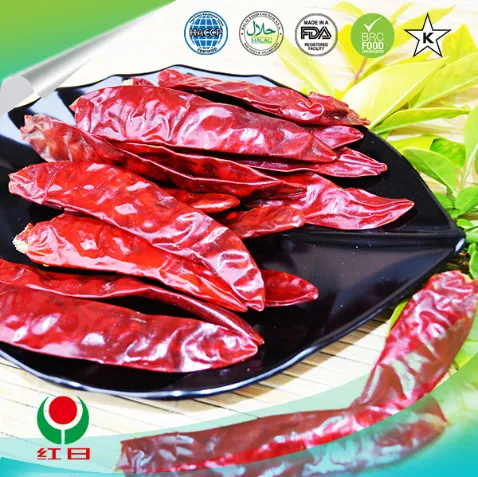- نمبر 268 Xianghe گهٽي، Xingtai شهر جي اقتصادي ترقي زون، Hebei 054001 چين
- Byron@hbhongri.cn
How Crushed Red Chili Pepper is Made: From Farm to Table
Crushed red chili pepper is a staple spice that adds heat and flavor to cuisines worldwide. Its journey from farm to table involves a meticulous process that preserves its vibrant color, fiery heat, and robust flavor. Understanding how this beloved spice is made sheds light on the care and precision that goes into its production, making it a true culinary marvel.

Cultivating the Perfect Chili Peppers About Crushed Red Chili Pepper
The journey begins with the ڪٽيل مرچ مرچ, primarily in regions with warm climates and rich soil. Popular varieties for crushed red chili pepper include cayenne, chili de árbol, and bird’s eye chili, known for their vibrant color and moderate-to-high heat levels. Farmers plant seeds in well-drained soil, ensuring proper spacing for healthy growth.
Crushed red pepper thrive under abundant sunlight and require regular watering, but overwatering is avoided to prevent root rot. Organic farming practices are often favored to maintain soil fertility and produce high-quality peppers free from chemical residues. After about three to four months, the peppers mature and develop their signature red hue, signaling they are ready for harvest.
Harvesting and Sorting About Crushed Red Chili Pepper
Harvesting chili peppers is a labor-intensive process that requires precision. The peppers are handpicked at their peak ripeness to ensure maximum flavor and heat. Once harvested, they are sorted to remove damaged or underripe peppers, as only the best-quality chilies are used for making crushed red chili pepper.
The sorted chilies are then washed thoroughly to remove dirt, pesticides, and other impurities. Cleanliness at this stage is critical, as it ensures the final product is safe for consumption and retains its pure, unadulterated flavor.
Drying the Crushed Red Chili Pepper
Drying is a crucial step that enhances the flavor and preserves the chilies for extended storage. Traditional sun-drying is still widely used in many regions, where peppers are spread out on large mats or trays under direct sunlight. This method not only dries the chilies but also deepens their color and intensifies their heat.
In industrial settings, mechanical dryers are used to ensure consistent drying, especially in regions with unpredictable weather. These dryers control temperature and airflow, producing evenly dried chilies that are free from mold and moisture. Properly dried chilies have a vibrant red color, a firm texture, and a concentrated flavor profile, making them ideal for crushing.
Crushing and Processing About Crushed Red Chili Pepper
Once dried, the chilies are ready for processing. The stems and seeds are often removed, though some seeds may be retained to enhance the heat of the final product. The dried chilies are then ground into flakes using specialized crushing machines. This step requires careful calibration to achieve the desired consistency—neither too fine nor too coarse.
The crushed chilies are sifted to remove any large, unwanted pieces, ensuring a uniform texture. Advanced processing facilities may use food-grade technology to enhance safety and quality, such as metal detectors to remove any foreign particles and vacuum packaging to preserve freshness.
Packaging and Storage for Crushed Red Chili Pepper
Packaging plays a vital role in maintaining the quality of crushed red chili pepper. The spice is packed in airtight containers, often made of glass or food-grade plastic, to protect it from moisture, light, and air. Labels indicating the variety, origin, and heat level are added to provide consumers with valuable information.
For large-scale distribution, bulk packaging is used, while smaller quantities are packed for retail. Storage conditions are carefully controlled to ensure the spice retains its vibrant color, bold flavor, and potent heat until it reaches the consumer.
Reaching the Consumer’s Table
Crushed red chili pepper completes its journey when it reaches kitchens worldwide. Home cooks and professional chefs alike appreciate its versatility, using it to enhance dishes ranging from pizzas and pastas to stir-fries and soups. Its accessibility and bold flavor make it a pantry essential, adding a touch of heat and excitement to countless recipes.
Preserving Quality at Home About Crushed Red Chili Pepper
To enjoy the full flavor of crushed red chili pepper, proper storage at home is essential. Keeping it in a cool, dry place away from direct sunlight prevents the spice from losing its potency. Airtight containers help maintain its aroma and flavor, ensuring that every sprinkle delivers its characteristic kick.
-
Capsicum frutescens oleoresin – High Purity, Food GradeخبرونNov.17,2025
-
Capsicum Frutescens Oleoresin – Natural Heat & FlavorخبرونNov.17,2025
-
Peppereka Powder – Fresh, Vibrant Color & Sweet AromaخبرونNov.17,2025
-
Paprika Oleoresin | Natural Red Color, Heat & Flavor BoostخبرونNov.17,2025
-
Pure Turmeric Extract 95% Curcumin | Potent, Lab-TestedخبرونNov.17,2025
-
Red Papper Pods – Premium Sun-Dried, Bold Heat & AromaخبرونNov.10,2025







